21 simple yoga poses for stress relief
Try these basic yoga moves for a healthier, more flexible, and calmer you.
Updated on September 20, 2023
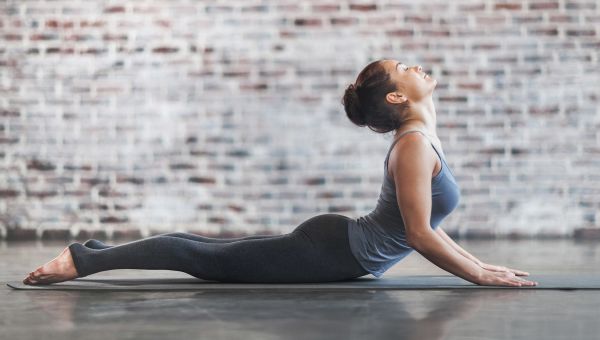
Think yoga's not right for you? Think again. "If you can breathe, you can do yoga," says San Diego-based yoga instructor Theresa Brennan. "Regardless of your strength or flexibility, yoga is accessible for everyone. The more you do, the better you get." Click through to learn 21 basic yoga poses that you can do from the comfort of your home. All you need is a yoga mat to get started.
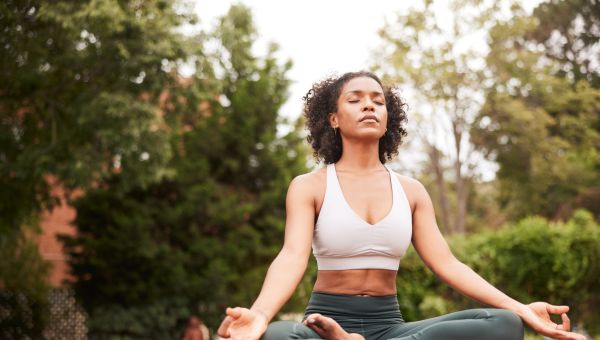
Easy Pose
This relatively simple seated posture, which opens the hips and strengthens the spine, is often done at the beginning or end of practice, usually along with meditation or yogic breathing.
How to do it: Sit on your mat with your back straight, shoulders relaxed and down. Bend your knees and cross… Show More
This relatively simple seated posture, which opens the hips and strengthens the spine, is often done at the beginning or end of practice, usually along with meditation or yogic breathing.
How to do it: Sit on your mat with your back straight, shoulders relaxed and down. Bend your knees and cross your right shin in front of your left, leaving a comfortable gap between your feet and your pelvis. Place your hands on your knees with your palms facing upward. Close your eyes. Hold this posture for a minute or longer if you wish.
Show Less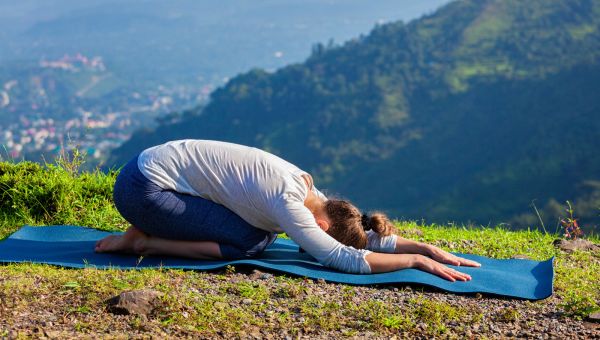
Child's Pose
Child’s pose is a gentle stretch to warm up your body, especially your lower back.
How to do it: Come down to your hands and knees, then sit back on your hips. Spread your knees wide and bring your toes together so your big toes touch. Sitting on your hips, fold forward, resting your head on the… Show More
Child’s pose is a gentle stretch to warm up your body, especially your lower back.
How to do it: Come down to your hands and knees, then sit back on your hips. Spread your knees wide and bring your toes together so your big toes touch. Sitting on your hips, fold forward, resting your head on the floor. Stretch your arms out in front or keep them at your sides. Remain in this position as you take several deep breaths.
Show Less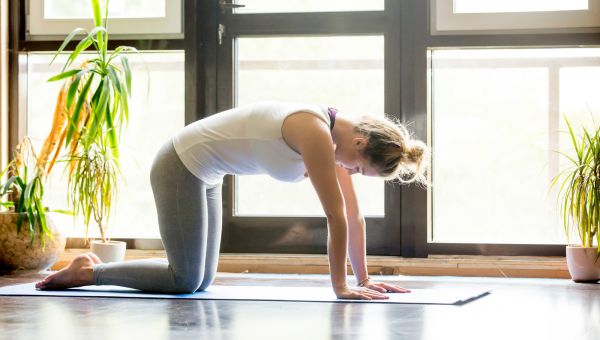
Cat-Cow
These two poses are especially good for reducing tension in your shoulders and neck.
How to do it: From child’s pose, come to all fours, or table pose. Put your hands and knees on the mat with your knees hip-width apart, shoulders aligned over your wrists. Take a deep breath in and arch your back… Show More
These two poses are especially good for reducing tension in your shoulders and neck.
How to do it: From child’s pose, come to all fours, or table pose. Put your hands and knees on the mat with your knees hip-width apart, shoulders aligned over your wrists. Take a deep breath in and arch your back like a cat, dropping your chin to your chest. Next, exhale and lift your chin as you drop your belly. Repeat two times or more. Remember to breathe.
Show Less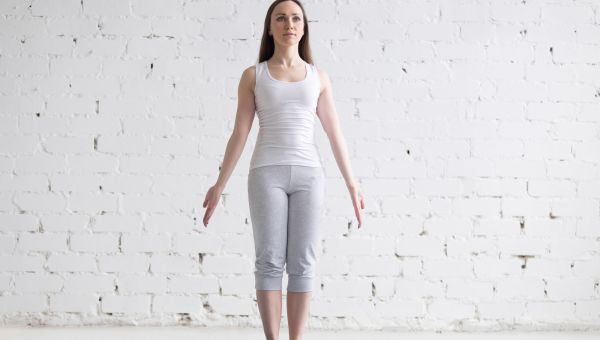
Mountain
This basic pose calms the mind, sharpens focus, and improves circulation.
How to do it: Stand with your feet parallel and hip-width apart. Firm your thighs to lift your kneecaps (don't lock the knees). Lift your toes to activate your arches and inner ankles. Release your toes back down, keeping… Show More
This basic pose calms the mind, sharpens focus, and improves circulation.
How to do it: Stand with your feet parallel and hip-width apart. Firm your thighs to lift your kneecaps (don't lock the knees). Lift your toes to activate your arches and inner ankles. Release your toes back down, keeping your feet active. Lengthen your tailbone down and engage your abdomen to protect your lower back. Keep your shoulders back and down while widening your collarbones and lifting your sternum. Imagine a straight line running from the center of your ankles all the way up through the crown of your head. Keep your eyes soft and breathe deeply. Hold the pose for three to five breaths.
Show Less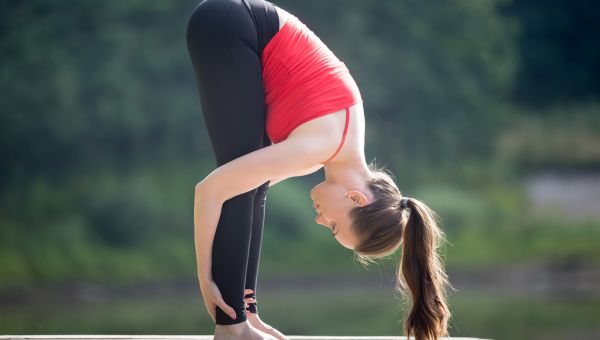
Standing Forward Bend
Standing forward bend helps loosen stiff hamstring muscles, promotes lower-body flexibility, and helps calm the mind.
How to do it: Stand in mountain pose with your hands on your hips. Exhale as you slowly bend forward at the hips (not the waist), lengthening the front of your torso until your… Show More
Standing forward bend helps loosen stiff hamstring muscles, promotes lower-body flexibility, and helps calm the mind.
How to do it: Stand in mountain pose with your hands on your hips. Exhale as you slowly bend forward at the hips (not the waist), lengthening the front of your torso until your hands or fingertips reach the floor, if possible. Rest your hands slightly in front of or beside your feet or bring your palms to the back of your ankles. Let your head hang gently. Rest your hands on a block if you are unable to reach the floor or cross your forearms and hold your elbows.
Show Less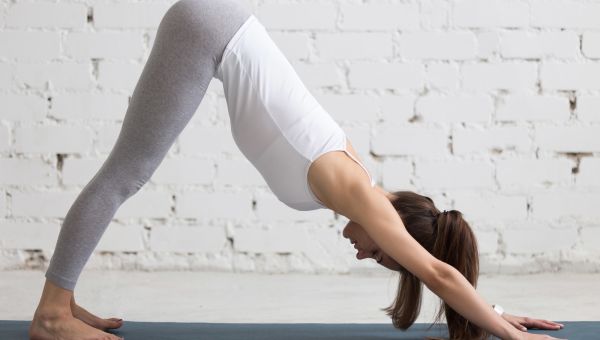
Downward Dog
Downward facing dog awakens the whole body. It lengthens your spine, builds shoulder and arm strength, and is calming.
How to do it: Come to all fours, or tabletop position. Walk your hands forward while keeping them shoulder-width apart. Press into your palms, curl your toes under, and lift your… Show More
Downward facing dog awakens the whole body. It lengthens your spine, builds shoulder and arm strength, and is calming.
How to do it: Come to all fours, or tabletop position. Walk your hands forward while keeping them shoulder-width apart. Press into your palms, curl your toes under, and lift your hips up toward the ceiling. Your feet should be hip-width apart and your gaze should fall between your feet. Be mindful to push forward through your hands while pressing back through your thighs to keep the weight of the body lifting up through the hips.
Show Less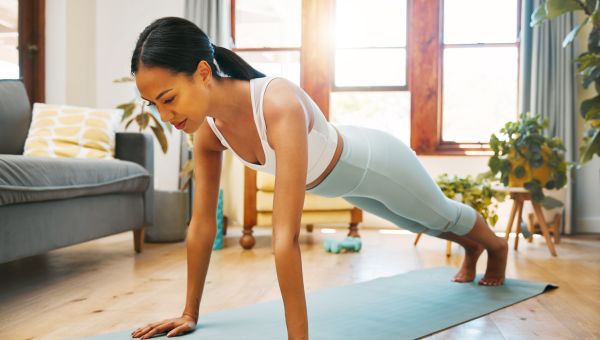
Plank
Plank pose is a great way to strengthen your core and tighten your abs.
How to do it: From downward dog, shift forward so that your shoulders are over your wrists. Spread your fingers wide and distribute your weight evenly through the surface area of each hand. Keep your abs engaged, arms straight… Show More
Plank pose is a great way to strengthen your core and tighten your abs.
How to do it: From downward dog, shift forward so that your shoulders are over your wrists. Spread your fingers wide and distribute your weight evenly through the surface area of each hand. Keep your abs engaged, arms straight and press the mat away from you. Hold the pose for five breaths.
Show Less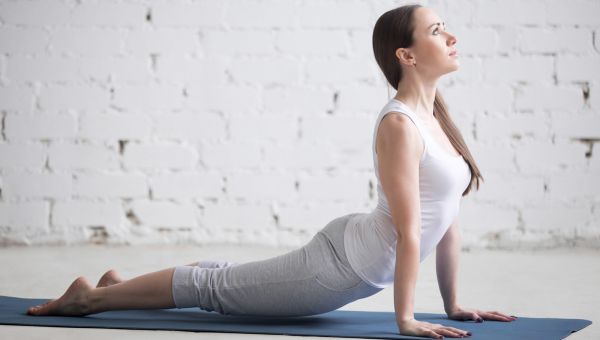
Cobra
This mild back bend helps open your chest. Some experts say that this posture also stimulates the thymus, a gland that produces white blood cells (called T cells) that help the body fight off infection.
How to do it: Lie down flat on your stomach. Bend your elbows and place your hands flat… Show More
This mild back bend helps open your chest. Some experts say that this posture also stimulates the thymus, a gland that produces white blood cells (called T cells) that help the body fight off infection.
How to do it: Lie down flat on your stomach. Bend your elbows and place your hands flat beside your shoulders. Push your hands into the mat and straighten your arms. This will cause your back to arch. Press the tops of your feet firmly onto the floor and reach the crown of your head toward the sky.
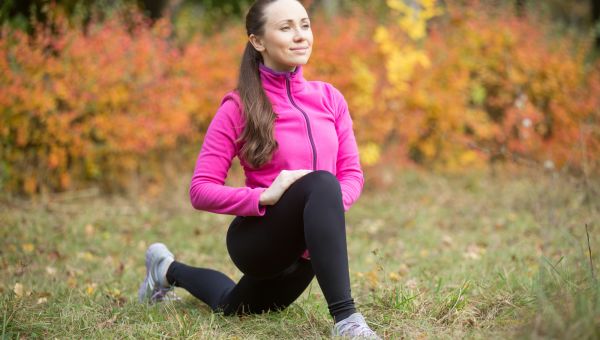
Low Lunge
This lunge variation strengthens your quads (thigh muscles) and glutes (butt muscles) and improves balance and concentration.
How to do it: From a standing position, step your right foot forward. Bend your right knee and let your hips ease down. Your knee should be at a right angle over your ankle.… Show More
This lunge variation strengthens your quads (thigh muscles) and glutes (butt muscles) and improves balance and concentration.
How to do it: From a standing position, step your right foot forward. Bend your right knee and let your hips ease down. Your knee should be at a right angle over your ankle. Bend your left knee so that it rests on the floor with your foot tucked under. Sweep your arms above your head. (If you have a neck, spinal, or shoulder injury, rest your hands on the floor.) Hold for one minute, taking several deep breaths. Switch to the other side.
Show Less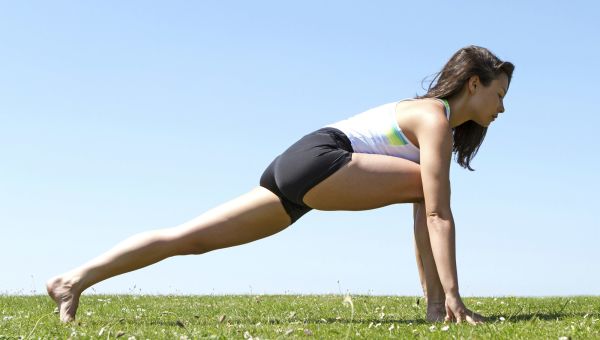
High Lunge
High lunge, like low lunge, strengthens your quads and glutes and improves balance and concentration.
How to do it: From standing forward bend, bend your knees and on an inhale step your left foot back toward the back edge of your mat, placing the ball of your foot on the floor. Step back far… Show More
High lunge, like low lunge, strengthens your quads and glutes and improves balance and concentration.
How to do it: From standing forward bend, bend your knees and on an inhale step your left foot back toward the back edge of your mat, placing the ball of your foot on the floor. Step back far enough so that your right knee can form a right angle. Lightly rest your torso on your front right thigh and lengthen it forward. At the same time, tighten your left thigh and push it up toward the ceiling, holding the left knee straight. Stretch your left heel toward the floor and gaze forward. Hold for one minute, taking several deep breaths. Switch to the other side.
Show Less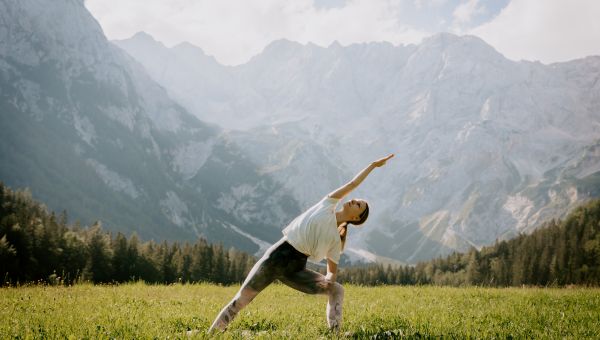
Extended Side Angle
Extended side angle strengthens your thighs and ankles.
How to do it: Take a big step to the side of your mat so that your feet are about four feet apart. Raise your arms parallel to the floor, palms facing down. With legs straight, turn your right foot out 90 degrees and slightly angle your left… Show More
Extended side angle strengthens your thighs and ankles.
How to do it: Take a big step to the side of your mat so that your feet are about four feet apart. Raise your arms parallel to the floor, palms facing down. With legs straight, turn your right foot out 90 degrees and slightly angle your left foot in. Exhale and bend your right knee, keeping it aligned over your right ankle. As you inhale, place your right forearm on your thigh and extend your left arm over your ear, elongating your body. Remain in the pose for five breaths, then switch sides.
Show Less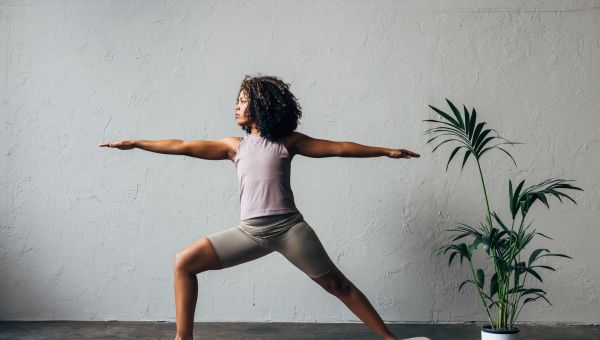
Warrior II
Also called fierce warrior, warrior II strengthens and stretches the legs, ankles, chest, and shoulders. Holding this pose increases stamina.
How to do it: Standing in mountain pose at the front of your mat, take a big step back with your left foot. Keep your right foot pointing straight and turn… Show More
Also called fierce warrior, warrior II strengthens and stretches the legs, ankles, chest, and shoulders. Holding this pose increases stamina.
How to do it: Standing in mountain pose at the front of your mat, take a big step back with your left foot. Keep your right foot pointing straight and turn your left foot so it’s at a 90-degree angle to your right foot. Your heels should align. Exhale as you bend your right leg. Extend your arms to the side at shoulder height, keeping them parallel to the floor. Turn your head to the right, looking straight over your extended right arm. Hold for one minute. Take slow, deep breaths. Repeat with your left foot in front.
Show Less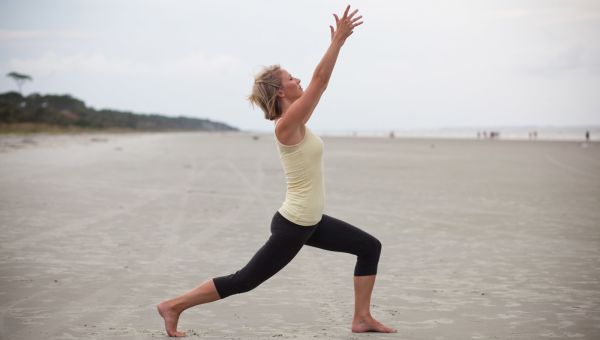
Warrior I
The warrior poses, which lift and expand the chest area, are sometimes referred to as heart openers. Try letting the expansiveness of these poses extend off the mat as well—you'll be opening yourself up to more joy.
How to do it: Stand tall with feet together, hip-width apart. Take a big… Show More
The warrior poses, which lift and expand the chest area, are sometimes referred to as heart openers. Try letting the expansiveness of these poses extend off the mat as well—you'll be opening yourself up to more joy.
How to do it: Stand tall with feet together, hip-width apart. Take a big step back with your left foot. Bend your right knee with your right foot pointed forward. Turn your left foot out about 45 degrees. Lean back and lift your heart (chest). Raise your arms to your sides, keeping them slightly bent, with palms up. Shift your gaze to the ceiling. Take several deep, calming breaths. Return to the starting position and repeat with your left foot in front.
Show Less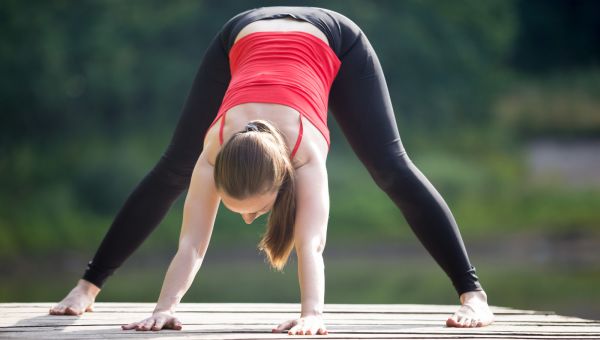
Wide-Legged Forward Fold
This calming pose is especially good for stretching tight hamstrings.
How to do it: Take a step so that your feet are three to four feet apart; your feet can be parallel or pointing slightly inward. Inhale and lift your chest. On an exhale, bend forward at the hips. As your body becomes parallel to… Show More
This calming pose is especially good for stretching tight hamstrings.
How to do it: Take a step so that your feet are three to four feet apart; your feet can be parallel or pointing slightly inward. Inhale and lift your chest. On an exhale, bend forward at the hips. As your body becomes parallel to the floor, place your hands or fingertips on the floor directly beneath your shoulders. Direct your gaze at the floor in front of you. Go only as far down as you can with straight legs. It's okay if your hands don't reach the floor; just grab a couple blocks and place one under each hand. Hold the pose for several breaths.
Show Less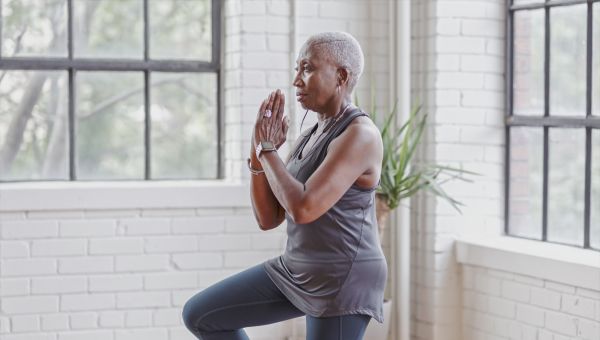
Tree
Tree pose improves balance and concentration as it stretches your inner thigh muscles and strengthens your calves, thighs, and foot muscles.
How to do it: Find a spot in front of you to focus on to help keep you from wobbling. Engage your abs and shift your weight to your left leg. Raise your right… Show More
Tree pose improves balance and concentration as it stretches your inner thigh muscles and strengthens your calves, thighs, and foot muscles.
How to do it: Find a spot in front of you to focus on to help keep you from wobbling. Engage your abs and shift your weight to your left leg. Raise your right foot and place the sole on the ankle, calf, or mid-thigh of your left leg (never the inside of the knee) with toes pointed downward. Allow your right knee to comfortably point to the side. Engage your abs so you can stand tall and straight. Raise your arms and hold the pose for several breaths, then switch sides.
Show Less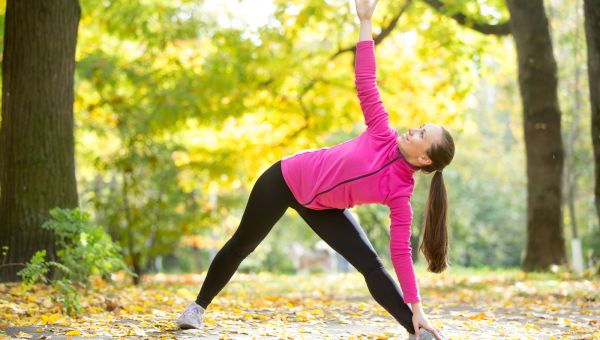
Triangle
Triangle pose is more than a feel-good stretch. “This pose opens your heart, allowing for an emotional release that can lead to an elevated mood,” says yoga expert Theresa Brennan.
How to do it: Stand with your feet three to four feet apart with arms raised at your sides. Slightly angle your… Show More
Triangle pose is more than a feel-good stretch. “This pose opens your heart, allowing for an emotional release that can lead to an elevated mood,” says yoga expert Theresa Brennan.
How to do it: Stand with your feet three to four feet apart with arms raised at your sides. Slightly angle your right foot in. Turn your left foot out 90 degrees. Hinge from the hips to the left, directly over your left leg. Rest your left hand in front of your left ankle or along your left leg; your chest should not collapse forward. Stretch your right arm toward the ceiling. Turn your head to gaze at your outstretched hand. Hold the pose for several breaths. Return to a standing position; repeat on the other side.
Show Less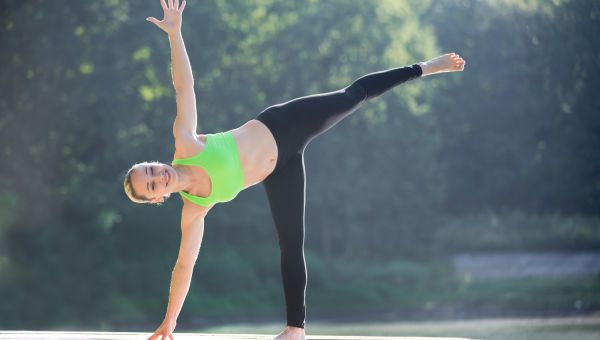
Half Moon
Resting one hand on a block makes it easier to maintain this chest-opening pose.
How to do it: Place your block about eight inches in front of your right foot. Shift your weight to your right leg and lean forward, placing your right hand on the block while keeping your arm straight. Allow your left… Show More
Resting one hand on a block makes it easier to maintain this chest-opening pose.
How to do it: Place your block about eight inches in front of your right foot. Shift your weight to your right leg and lean forward, placing your right hand on the block while keeping your arm straight. Allow your left leg to lift so that it’s parallel to the ground. Straighten and firm the muscles of your right leg to stabilize the pose. Rotate your torso to the left and lift your left arm straight to the ceiling. Allow your head to follow and shift your gaze to your extended left hand. Return to standing position and repeat on the other side.
Show Less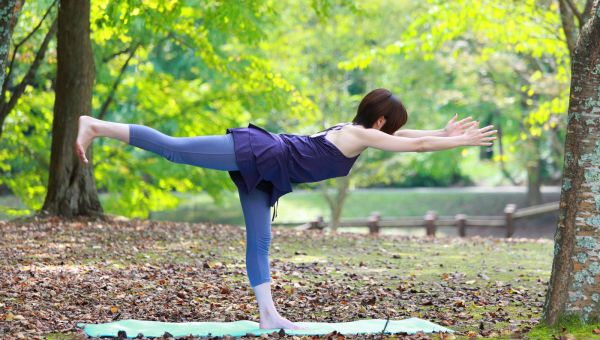
Warrior III
When stress and tension run high, warrior III can help calm your nerves, reduce anxiety—and take you to a happier place.
How to do it: Stand tall with your feet hip-width apart. Step your right foot back by about two feet. With your left foot pointing straight ahead, shift your weight to your left… Show More
When stress and tension run high, warrior III can help calm your nerves, reduce anxiety—and take you to a happier place.
How to do it: Stand tall with your feet hip-width apart. Step your right foot back by about two feet. With your left foot pointing straight ahead, shift your weight to your left leg. Bend forward and lift your right leg, keeping it parallel to the ground. Shift your gaze straight down. Extend your arms forward with palms facing each other. Contract your abs and engage the muscles of your left leg to help maintain balance. Hold the pose for 5 to 10 breaths. Return to a standing position and repeat on the other side.
Show Less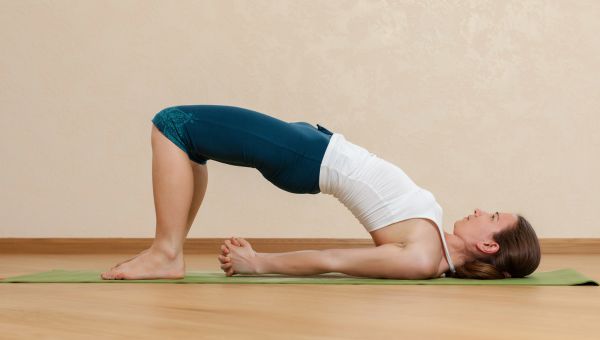
Bridge
How to do it: Lie on your back, arms at your sides and palms down. Bend your knees, bringing your heels as close to your sitting bones as possible. Place your feet hip-width apart and parallel. Exhale, pressing down through your feet and hands while lifting your hips until your thighs are parallel… Show More
How to do it: Lie on your back, arms at your sides and palms down. Bend your knees, bringing your heels as close to your sitting bones as possible. Place your feet hip-width apart and parallel. Exhale, pressing down through your feet and hands while lifting your hips until your thighs are parallel to the floor. Tighten your buttocks and tilt your tailbone up to lengthen your lower back. To deepen the pose, roll your shoulders under and clasp your hands as you press your sternum toward your chin, and broaden your shoulder blades. If your shoulders are tight, extend your arms, palms down alongside your body. Hold for 3 to 5 breaths, coming out of the pose on an exhalation.
Show Less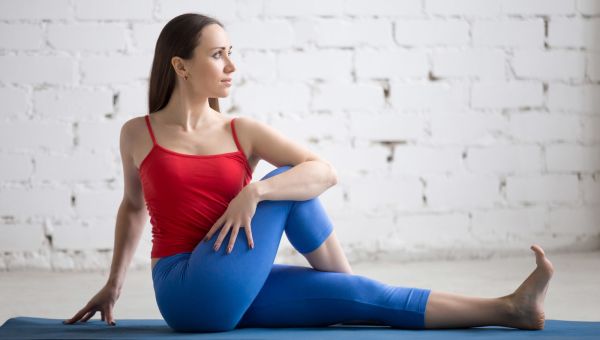
Seated Spinal Twist
How to do it: Sit up straight with your legs extended in front of you. Bend your right knee and cross your right foot over your left leg. Set your foot flat on the floor. Wrap your left arm around your knee and hug it toward your chest. Place your right hand on the floor behind you for support.… Show More
How to do it: Sit up straight with your legs extended in front of you. Bend your right knee and cross your right foot over your left leg. Set your foot flat on the floor. Wrap your left arm around your knee and hug it toward your chest. Place your right hand on the floor behind you for support. Inhale, lengthen your spine and exhale gently, twisting to the right and turning your gaze behind you. Release the pose slowly, turning your head last. Repeat on the other side.
Show Less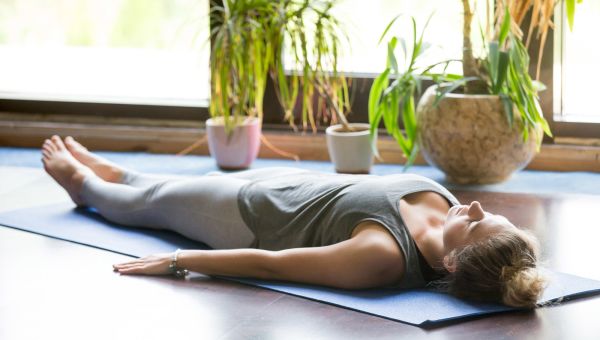
Final Relaxation Pose
This posture is done at the end of a practice and can often be coupled with guided meditation. “This pose allows your body to absorb your yoga practice while in a relaxed state," Brennan says.
How to do it: Lie down on your mat. Lengthen your legs, letting your legs and feet naturally roll outward.… Show More
This posture is done at the end of a practice and can often be coupled with guided meditation. “This pose allows your body to absorb your yoga practice while in a relaxed state," Brennan says.
How to do it: Lie down on your mat. Lengthen your legs, letting your legs and feet naturally roll outward. Place your arms by your sides at a 45-degree angle, palms facing up, completely relaxed. Close your eyes and breathe normally.
Show LessMore On


video

article
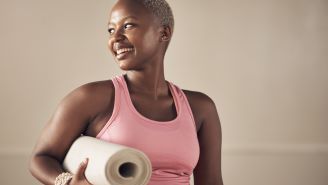
slideshow


video


video
